begin quote from:
Hurricane Laura batters the Louisiana coastline with an intensity the region has not seen in over a century
Is your power out or device's battery charge low? Bookmark CNN's lite site for text-only top stories.
(CNN)An extremely powerful Hurricane Laura is ripping apart portions of Louisiana and far-eastern Texas, roaring ashore initially as a Category 4 storm, killing at least one person and tearing up roofs while knocking out power for hundreds of thousands.
Laura -- the region's strongest storm in over a century -- made landfall at about 1 a.m. CT with sustained winds of 150 mph. By 10 a.m. CT, the storm still was raging more than 100 miles inland over Louisiana at Category 1 strength, with sustained winds of 75 mph.
Communities including Louisiana's Lake Charles city, some 35 miles inland, are littered with widespread wind destruction. Across the city, roofs and walls are damaged, trees are snapped, twisted and broken; steel poles and lampposts are bent; street signs are torn from the ground.
Content by CNN Underscored
How to sell your old tech before it loses its value.
CNN Underscored partnered with Decluttr to create this content. When you make a purchase, CNN receives revenue.
Wind gusts of more than 120 mph raked that area intermittently for an hour overnight, CNN's meteorologists say.
"The damage is extensive," Louisiana Gov. John Bel Edwards told CNN. "It appears now we have more structural damage from the wind" than storm surge.

James Sonya surveys what is left of his uncle's barber shop Thursday in Lake Charles, Louisiana.
More than 1,500 search and rescue personnel, plus 400 boats and high-water vehicles were headed Thursday morning to the worst-hit places, Edwards said. Winds were still too strong for helicopters to fly.
In East Texas, rescue teams were out in the Beaumont, Port Arthur and Orange areas, Gov. Greg Abbott said, noting major evacuations "no doubt saved lives." Further north, tornadoes were still a threat.
At least one person has died as a result of the storm. A 14-year-old girl died when a tree fell on her home in Louisiana's Vernon Parish, the governor's office said.

Damage to a building is seen Thursday in Vinton, Louisiana, in this photo from CNN affiliate KXAN.
In Lake Charles, Paul Heard left his house just as the storm was pulling part of the roof off around 1 a.m., he said.
He took shelter in his car. As he watched from 25 feet away, he "could see my roof was heaving up and down several inches."
"There's a lot of damage. People are going to need a lot of help around here," Heard told CNN.

Flooding inundates the Crystal Beach and Galveston areas near Texas' coast, aerial video from KRTK shows.
Laura tied with a hurricane from more than 160 years ago for the strongest storm to hit Louisiana. The 1856 hurricane also had winds of 150 mph when it made landfall, CNN meteorologist Brandon Miller said.
More destruction is ahead: Parts of northern and central Louisiana still were under a hurricane warning late Thursday morning, as the storm's center pushed toward Arkansas.
"Laura will likely set the standard for a near worst-case scenario with a landfalling tropical system in our region," the National Weather Service's Shreveport, Louisiana, office wrote Thursday morning.
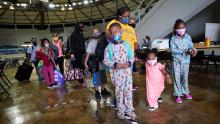
Photos: Hurricane Laura makes landfall
Victoria Nelson lines up her children, Autum Nelson, 2, Shawn Nelson, 7, and Asia Nelson, 6, as they board a bus to evacuate Lake Charles, Louisiana, ahead of Hurricane Laura's landfall August 26.
Hide Caption
21 of 40
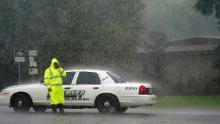
Photos: Hurricane Laura makes landfall
A sheriff's deputy wipes his face while manning a roadblock in Lake Charles, Louisiana, on August 26.
Hide Caption
22 of 40

Photos: Hurricane Laura makes landfall
Families line up to board buses to evacuate Lake Charles on August 26.
Hide Caption
23 of 40

Photos: Hurricane Laura makes landfall
Children play at the Circuit of the Americas racetrack, where some evacuees were settling in Austin, Texas, on August 26.
Hide Caption
24 of 40
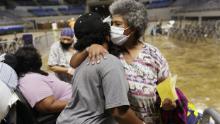
Photos: Hurricane Laura makes landfall
Demeteri Bushnell is hugged by her great-niece as they and other evacuees prepare to board a bus in Lake Charles.
Hide Caption
25 of 40
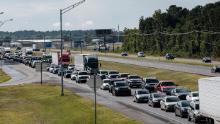
Photos: Hurricane Laura makes landfall
Traffic is at a near-standstill on Interstate 10 as people evacuate the region near Jennings, Louisiana, on Tuesday, August 25.
Hide Caption
26 of 40
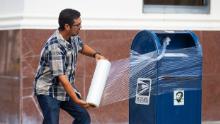
Photos: Hurricane Laura makes landfall
A US Postal Service employee covers a mailbox with plastic wrap in Galveston, Texas. The plastic wrap signals that the final mail has been cleared from the box, and it prevents people from placing mail inside that could be lost in a flood.
Hide Caption
27 of 40
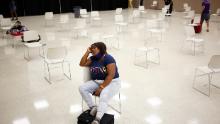
Photos: Hurricane Laura makes landfall
An evacuee waits to board a bus in Port Arthur, Texas, on August 25.
Hide Caption
28 of 40
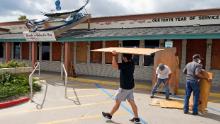
Photos: Hurricane Laura makes landfall
Nick Gaido, left, helps board up windows at his seafood restaurant in Galveston.
Hide Caption
29 of 40

Photos: Hurricane Laura makes landfall
Roman Tatriot, with the help of family and friends, rounds up cattle in Cameron, Louisiana, so he can get them to higher ground.
Hide Caption
30 of 40

Photos: Hurricane Laura makes landfall
A family walks to a charter bus that would take them from Galveston Island to Austin.
Hide Caption
31 of 40

Photos: Hurricane Laura makes landfall
Katy Gay carries a dog as the Houston SPCA transferred more than 100 animals to the Austin Humane Society.
Hide Caption
32 of 40
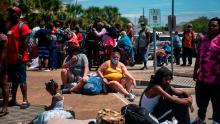
Photos: Hurricane Laura makes landfall
People wait to board a bus to leave Galveston.
Hide Caption
33 of 40
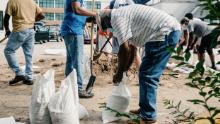
Photos: Hurricane Laura makes landfall
People make sandbags at St. Raymond Church in New Orleans.
Hide Caption
34 of 40
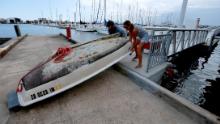
Photos: Hurricane Laura makes landfall
People tie down their vessels along Louisiana's Lake Pontchartrain on Sunday, August 23.
Hide Caption
35 of 40
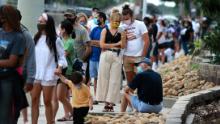
Photos: Hurricane Laura makes landfall
People stand in long lines before entering a New Orleans Costco to pick up supplies.
Hide Caption
36 of 40
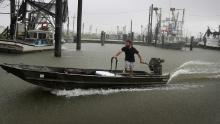
Photos: Hurricane Laura makes landfall
Michael Kent moves his boat in Venice, Louisiana, on August 23.
Hide Caption
37 of 40
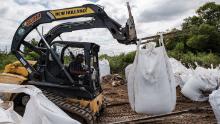
Photos: Hurricane Laura makes landfall
Crews bring sandbags to help with flooding prevention in Belle Chasse, Louisiana.
Hide Caption
38 of 40
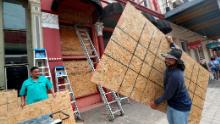
Photos: Hurricane Laura makes landfall
Cesar Reyes, right, carries a sheet of plywood as he helps install window coverings at a business in Galveston.
Hide Caption
39 of 40

Photos: Hurricane Laura makes landfall
Houston firefighters prepare rescue equipment in advance of the storm.
Hide Caption
40 of 40

Photos: Hurricane Laura makes landfall
Reginald Duhon prepares to clean up around his home in Lake Charles, Louisiana, after Hurricane Laura moved through the state on Thursday, August 27.
Hide Caption
1 of 40

Photos: Hurricane Laura makes landfall
James Sonya surveys what is left of his uncle's barber shop in Lake Charles.
Hide Caption
2 of 40

Photos: Hurricane Laura makes landfall
The driver of an overturned 18 wheeler truck exits his vehicle after police arrive to the scene along I-10 in Vinton, Texas, in the aftermath of Hurricane Laura. Both the driver and a passenger suffered minor injuries.
Hide Caption
3 of 40

Photos: Hurricane Laura makes landfall
Capitol One Bank Tower is seen with its windows blown out in the downtown area of Lake Charles.
Hide Caption
4 of 40

Photos: Hurricane Laura makes landfall
Mitch Pickering plays his guitar while walking amid storm debris in Lake Charles.
Hide Caption
5 of 40

Photos: Hurricane Laura makes landfall
A tree is uprooted in the aftermath of Hurricane Laura in Sabine Pass, Texas, on August 27.
Hide Caption
6 of 40

Photos: Hurricane Laura makes landfall
A police officer and resident work to clear debris from a street in Lake Charles.
Hide Caption
7 of 40

Photos: Hurricane Laura makes landfall
A hotel room that had its roof blown is pictured in Lake Charles.
Hide Caption
8 of 40
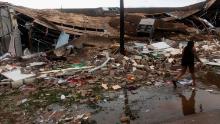
Photos: Hurricane Laura makes landfall
A person walks past a destroyed building in the wake of Hurricane Laura in Lake Charles.
Hide Caption
9 of 40

Photos: Hurricane Laura makes landfall
Storm debris is seen strewn across an escalator inside the Capitol One Bank Tower in Lake Charles.
Hide Caption
10 of 40

Photos: Hurricane Laura makes landfall
A tangle of power lines hangs over a street in Lake Charles.
Hide Caption
11 of 40

Photos: Hurricane Laura makes landfall
Damage to the Golden Nugget Hotel in Lake Charles is pictured on August 27.
Hide Caption
12 of 40
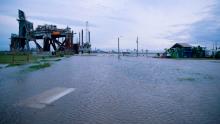
Photos: Hurricane Laura makes landfall
Flooding caused by Hurricane Laura is seen in Sabine Pass, Texas, on Thursday.
Hide Caption
13 of 40

Photos: Hurricane Laura makes landfall
A photo taken by a reporter with WVUE shows how the storm tore through the walls of their TV station in New Orleans, Louisiana.
Hide Caption
14 of 40

Photos: Hurricane Laura makes landfall
Down power lines stretch across a road in the aftermath of Hurricane Laura in Sabine Pass, Texas.
Hide Caption
15 of 40
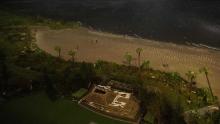
Photos: Hurricane Laura makes landfall
A flattened structure is seen near a beach in Lake Charles, Louisiana, as the eye wall of hurricane Laura passes over, early on Thursday.
Hide Caption
16 of 40

Photos: Hurricane Laura makes landfall
A single truck is parked in an open lot as heavy rains from hurricane Laura fall in Lake Charles, Louisiana, on Wednesday, August 26.
Hide Caption
17 of 40
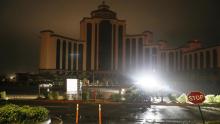
Photos: Hurricane Laura makes landfall
The L'Auberge Casino Resort is seen after the lights went out with the arrival of Hurricane Laura in Lake Charles on August 27.
Hide Caption
18 of 40
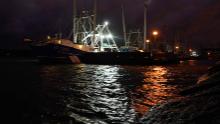
Photos: Hurricane Laura makes landfall
Shrimp boat Sea Lion V prepares for Hurricane Laura's landfall on August 26.
Hide Caption
19 of 40
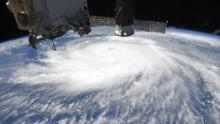
Photos: Hurricane Laura makes landfall
This photo of Hurricane Laura was taken from aboard the International Space Station on August 26.
Hide Caption
20 of 40

Photos: Hurricane Laura makes landfall
Victoria Nelson lines up her children, Autum Nelson, 2, Shawn Nelson, 7, and Asia Nelson, 6, as they board a bus to evacuate Lake Charles, Louisiana, ahead of Hurricane Laura's landfall August 26.
Hide Caption
21 of 40

Photos: Hurricane Laura makes landfall
A sheriff's deputy wipes his face while manning a roadblock in Lake Charles, Louisiana, on August 26.
Hide Caption
22 of 40

Photos: Hurricane Laura makes landfall
Families line up to board buses to evacuate Lake Charles on August 26.
Hide Caption
23 of 40

Photos: Hurricane Laura makes landfall
Children play at the Circuit of the Americas racetrack, where some evacuees were settling in Austin, Texas, on August 26.
Hide Caption
24 of 40

Photos: Hurricane Laura makes landfall
Demeteri Bushnell is hugged by her great-niece as they and other evacuees prepare to board a bus in Lake Charles.
Hide Caption
25 of 40

Photos: Hurricane Laura makes landfall
Traffic is at a near-standstill on Interstate 10 as people evacuate the region near Jennings, Louisiana, on Tuesday, August 25.
Hide Caption
26 of 40

Photos: Hurricane Laura makes landfall
A US Postal Service employee covers a mailbox with plastic wrap in Galveston, Texas. The plastic wrap signals that the final mail has been cleared from the box, and it prevents people from placing mail inside that could be lost in a flood.
Hide Caption
27 of 40

Photos: Hurricane Laura makes landfall
An evacuee waits to board a bus in Port Arthur, Texas, on August 25.
Hide Caption
28 of 40

Photos: Hurricane Laura makes landfall
Nick Gaido, left, helps board up windows at his seafood restaurant in Galveston.
Hide Caption
29 of 40

Photos: Hurricane Laura makes landfall
Roman Tatriot, with the help of family and friends, rounds up cattle in Cameron, Louisiana, so he can get them to higher ground.
Hide Caption
30 of 40

Photos: Hurricane Laura makes landfall
A family walks to a charter bus that would take them from Galveston Island to Austin.
Hide Caption
31 of 40

Photos: Hurricane Laura makes landfall
Katy Gay carries a dog as the Houston SPCA transferred more than 100 animals to the Austin Humane Society.
Hide Caption
32 of 40

Photos: Hurricane Laura makes landfall
People wait to board a bus to leave Galveston.
Hide Caption
33 of 40

Photos: Hurricane Laura makes landfall
People make sandbags at St. Raymond Church in New Orleans.
Hide Caption
34 of 40

Photos: Hurricane Laura makes landfall
People tie down their vessels along Louisiana's Lake Pontchartrain on Sunday, August 23.
Hide Caption
35 of 40

Photos: Hurricane Laura makes landfall
People stand in long lines before entering a New Orleans Costco to pick up supplies.
Hide Caption
36 of 40

Photos: Hurricane Laura makes landfall
Michael Kent moves his boat in Venice, Louisiana, on August 23.
Hide Caption
37 of 40

Photos: Hurricane Laura makes landfall
Crews bring sandbags to help with flooding prevention in Belle Chasse, Louisiana.
Hide Caption
38 of 40

Photos: Hurricane Laura makes landfall
Cesar Reyes, right, carries a sheet of plywood as he helps install window coverings at a business in Galveston.
Hide Caption
39 of 40

Photos: Hurricane Laura makes landfall
Houston firefighters prepare rescue equipment in advance of the storm.
Hide Caption
40 of 40

Photos: Hurricane Laura makes landfall
Reginald Duhon prepares to clean up around his home in Lake Charles, Louisiana, after Hurricane Laura moved through the state on Thursday, August 27.
Hide Caption
1 of 40

Photos: Hurricane Laura makes landfall
James Sonya surveys what is left of his uncle's barber shop in Lake Charles.
Hide Caption
2 of 40

Photos: Hurricane Laura makes landfall
The driver of an overturned 18 wheeler truck exits his vehicle after police arrive to the scene along I-10 in Vinton, Texas, in the aftermath of Hurricane Laura. Both the driver and a passenger suffered minor injuries.
Hide Caption
3 of 40

Photos: Hurricane Laura makes landfall
Capitol One Bank Tower is seen with its windows blown out in the downtown area of Lake Charles.
Hide Caption
4 of 40

Photos: Hurricane Laura makes landfall
Mitch Pickering plays his guitar while walking amid storm debris in Lake Charles.
Hide Caption
5 of 40

Photos: Hurricane Laura makes landfall
A tree is uprooted in the aftermath of Hurricane Laura in Sabine Pass, Texas, on August 27.
Hide Caption
6 of 40

Photos: Hurricane Laura makes landfall
A police officer and resident work to clear debris from a street in Lake Charles.
Hide Caption
7 of 40

Photos: Hurricane Laura makes landfall
A hotel room that had its roof blown is pictured in Lake Charles.
Hide Caption
8 of 40

Photos: Hurricane Laura makes landfall
A person walks past a destroyed building in the wake of Hurricane Laura in Lake Charles.
Hide Caption
9 of 40

Photos: Hurricane Laura makes landfall
Storm debris is seen strewn across an escalator inside the Capitol One Bank Tower in Lake Charles.
Hide Caption
10 of 40

Photos: Hurricane Laura makes landfall
A tangle of power lines hangs over a street in Lake Charles.
Hide Caption
11 of 40

Photos: Hurricane Laura makes landfall
Damage to the Golden Nugget Hotel in Lake Charles is pictured on August 27.
Hide Caption
12 of 40

Photos: Hurricane Laura makes landfall
Flooding caused by Hurricane Laura is seen in Sabine Pass, Texas, on Thursday.
Hide Caption
13 of 40

Photos: Hurricane Laura makes landfall
A photo taken by a reporter with WVUE shows how the storm tore through the walls of their TV station in New Orleans, Louisiana.
Hide Caption
14 of 40

Photos: Hurricane Laura makes landfall
Down power lines stretch across a road in the aftermath of Hurricane Laura in Sabine Pass, Texas.
Hide Caption
15 of 40

Photos: Hurricane Laura makes landfall
A flattened structure is seen near a beach in Lake Charles, Louisiana, as the eye wall of hurricane Laura passes over, early on Thursday.
Hide Caption
16 of 40

Photos: Hurricane Laura makes landfall
A single truck is parked in an open lot as heavy rains from hurricane Laura fall in Lake Charles, Louisiana, on Wednesday, August 26.
Hide Caption
17 of 40

Photos: Hurricane Laura makes landfall
The L'Auberge Casino Resort is seen after the lights went out with the arrival of Hurricane Laura in Lake Charles on August 27.
Hide Caption
18 of 40

Photos: Hurricane Laura makes landfall
Shrimp boat Sea Lion V prepares for Hurricane Laura's landfall on August 26.
Hide Caption
19 of 40

Photos: Hurricane Laura makes landfall
This photo of Hurricane Laura was taken from aboard the International Space Station on August 26.
Hide Caption
20 of 40


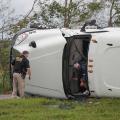
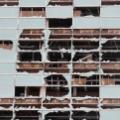




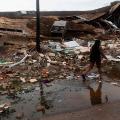

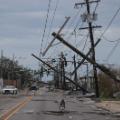

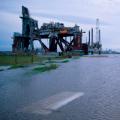


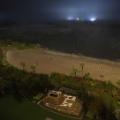

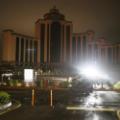
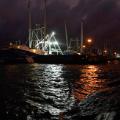
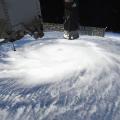
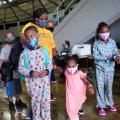
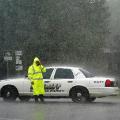


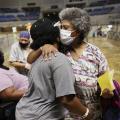
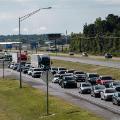

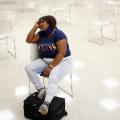
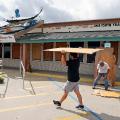



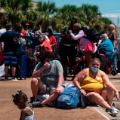

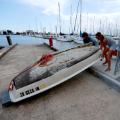
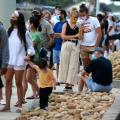
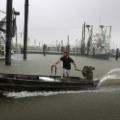
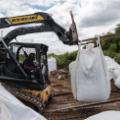
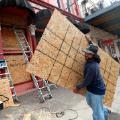
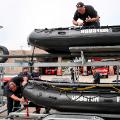
Latest developments
Still a threat: As of 10 a.m. CT, Laura was a Category 1 hurricane with maximum sustained winds of 75 mph winds, headed north. Damaging wind gusts are possible in parts of northern Louisiana and Arkansas though Thursday evening, the National Hurricane Center said.
More rain: From late Thursday morning onward, Laura was expected to drop another 4 to 8 inches of rain across parts of Louisiana, Arkansas and Mississippi. Isolated amounts of 18 inches are possible in Louisiana, the NHC said.
Storm surge: EMA Administrator Peter Gaynor said Thursday surges may not have been as high as feared a day earlier. The NHC says waters near the coast were elevated but would subside Thursday afternoon.
Power out: More than 680,000 customers in Texas and Louisiana were without power Thursday morning, according to PowerOutages.us.
Crawling out from a barricade to find the roof is gone
Details of damage were accumulating as the sun rose Thursday morning.
Wide portions of Crystal Beach, Texas, have been flooded. Water flowed over fields and roads, video from CNN affiliate KTRK showed.
Water also lapped up against buildings in Sabine Pass, Texas, photos from Getty Images showed.

Flooding is seen Thursday in Sabine Pass, Texas.
In Louisiana's Lake Charles, Tolor White Jr. had dozed off while doing a crossword puzzle under a makeshift "barricade" made of a table and some mattresses. He awoke around 1:15 a.m. to a loud noise, he said.
Part of his roof had been torn off. Water dripped into one of his rooms, and wind had blown out some of his windows.
"I slept through most of it," he said.
Brandon Clement, a storm chaser, was in a Lake Charles parking lot early Thursday when he saw a RV topple over.
"You could actually hear (the storm) coming ... I could see it racing across the parking lot at me ... and the RV just went," he said.

This RV overturned early Thursday in Lake Charles.
Calcasieu Parish, where the city of Lake Charles is located, has about 100,000 residents who were at risk of flooding, parish spokesman Tom Hoefer told CNN.
Just west of Lake Charles, in the city of Sulphur, John Burch's home lost power shortly after 1:30 a.m.
"There's a tree down in every person's yard," Burch said.
Mat Mcgee told CNN he was near the eyewall of Hurricane Laura when he saw the metal building in front of his barge get ripped apart in Hackberry, Louisiana.
The wind pulled off the roof, the door and knocked over the tower on the site.

John Burch stood in his street with neighbors as the storm's eye passed overnight, he told CNN.
The fate of inland residents continued to be a top worry Thursday morning for retired US Army Lt. Gen. Russel Honore, who coordinated the joint military response in 2005 to Hurricane Katrina in New Orleans, then weeks later aided the response to Hurricane Rita, which hit around the same places as Laura.
"We might have gotten a break on the projected surge (from Laura), but I would suspect much of Cameron (Parish along the coast) is pretty bad torn up, particularly all the reconstruction that had happened since Hurricane Rita," Honore told CNN from Baton Rouge.
Honore feared many who live away from the coast had opted to ride out Laura at home, he said.
"In Lake Charles, a lot of people could be hurt, and as you go further north into Beauregard Parish and up toward Fort Polk, a lot of folks live up there in mobile homes, and I only fear -- knowing that Cameron was fully evacuated, a big effort in Calcasieu (Parish) and Lake Charles to get people to evacuated -- I hope the same was done further north because this could be very devastating ... where people don't live in very sturdy homes," he said. "That is my biggest concern."

A Lake Charles street is seen strewn with debris and downed power lines Thursday after Hurricane Laura passed through the area.
The coronavirus pandemic complicated evacuations. Due to safety concerns associated with the Covid-19 outbreak, officials sent evacuees to hotel rooms, said Mike Steele, a spokesman for Louisiana's office of Homeland Security and Emergency Preparedness.
Laura is the seventh named storm to make landfall in the US so far this year, a record for the most to do so before the end of August. There have been four tropical storms and three hurricanes.
CNN's Martin Savidge, Gary Tuchman, Brandon Miller, Joe Sutton, Devon Sayers, Andy Rose, Michelle Krupa, Paul P. Murphy and Dave Alsup contributed to this report.
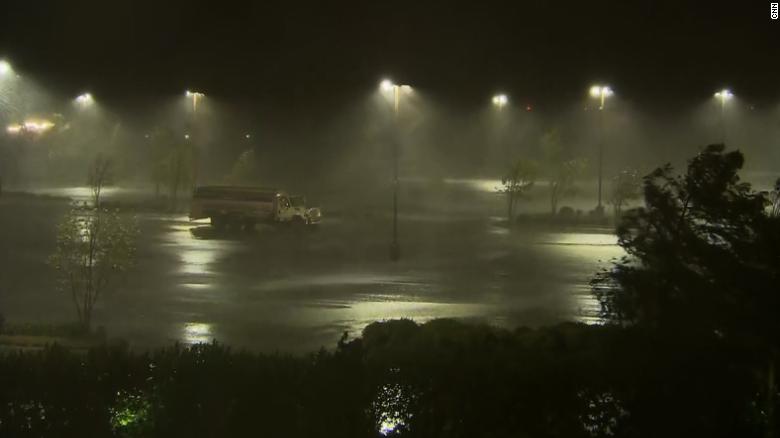










No comments:
Post a Comment